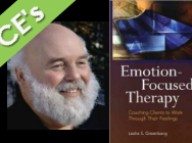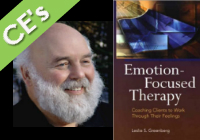A Conversation with Dr. Leslie Greenberg hosted by Dr. Lisa Firestone – Dr. Leslie Greenberg is a co-founder of emotion-focused therapy (EFT), He is also the director for the Emotion-Focused Therapy Clinic housed at York University. Greenberg is a founding member of the Society of the Exploration of Psychotherapy Integration (SEPI) and the Society for Constructivism in Psychotherapy (SCP). He is the author of several books, including Emotion-Focused Couples Therapy: The Dynamics of Emotion, Love and Power and Emotion-Focused Therapy for Depression and Emotion Focused Therapy. Theory and Practice.
Emotion Focused Therapy (EFT) is based on the notion that emotions act as our internal compass, guiding our actions, informing our desires, and helping us to grow and develop healthy attachments. The focus of therapy is on the awareness, regulation and transformation of emotions in order to facilitate behavioral change. EFT helps people gain awareness of and experience their emotions safely within a therapy session and change them when they are maladaptive.
EFT therapists are trained to identify primary and secondary emotions as well as adaptive and maladaptive emotions. For example, sometimes anger is displayed as a secondary emotion, because it masks the primary emotion of fear or sadness at other times shame or fear are maladaptive emotions. People then learn to understand, manage, and transform maladaptive emotions through EFT, so that they can access and utilize healthy, adaptive emotions, such as compassion, empowering anger or grief. Greenberg refers to his approach to couples as partners being each other’s “affective regulators” and he aims to help people in relationships express their attachment and identity emotions more fully.
Learning Objectives:
- Describe different types of emotional expression.
- Assess when to regulate and when to access emotion.
- Plan to intervene differentially with emotion.
For more information on Dr. Greenberg and Emotional Focused Therapy visit http://www.emotionfocusedclinic.org/
Presenter: Leslie Greenberg, Ph.D. (Interviewed by Dr. Lisa Firestone)
Price: $15 (CE’s not included)
60 Minutes
$15.00Add to cart
Optional 3 CE Credits sold separately More Info Here
Ordering Information:
Once payment is received, you will be e-mailed a full video recording of this Webinar along with all presentation materials.
Optional CEs (3) may be purchased through R. Cassidy Seminars for $15. A link to purchase CE credits will be included in the email containing all your Webinar resources. More Info Here
Continuing Education Information:
This event is co-sponsored by R. Cassidy Seminars. A link to purchase CE credits will be provided to all Webinar registrants.
Satisfactory Completion
Participants must have paid tuition fee, signed in, attended the entire seminar, completed any accompanying reading assignment, completed an evaluation, and signed out in order to receive a certificate. Failure to sign in or out will result in forfeiture of credit for the entire course. No exceptions will be made. Partial credit is not available.
Psychologists
Cassidy Seminars is approved by the American Psychological Association (APA) to offer continuing education for psychologists. R. Cassidy Seminars maintains responsibility for this program. 3
Social Workers
Cassidy Seminars, ACE provider #1082 is approved as a provider for social work continuing education by the Association of Social Work Boards (ASWB) www.aswb.org, through the Approved Continuing Education (ACE) Program. Approval Period: April 15, 2012-April 15, 2015. R. Cassidy Seminars maintains responsibility for the program. Social workers should contact their regulatory board to determine course approval. Social workers will receive 3 continuing education (clinical, social work ethics) clock hours in participating in this course.
Please Note: Licensing Boards change regulations often and while we attempt to stay abreast of their most recent changes, if you have questions or concerns about this course meeting your specific board’s approval, we recommend you contact your board directly to obtain a ruling.
Note: Many state boards accept offerings accredited by national or other state organizations. If your state is not listed, please check with your professional licensing board to determine whether the accreditations listed are accepted.








